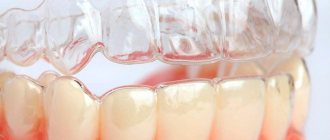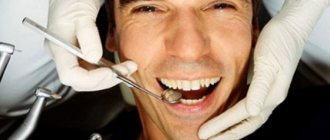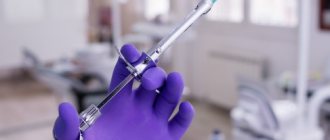Consultation with a doctor A pregnant woman is bombarded with myths from all sides about what can and cannot be done during this period. These superstitions even affect dental procedures. Pregnant women, listening to outside advice, refuse pain relief while undergoing gum treatment and endure pain, or try to avoid visiting the dentist altogether. But often such myths are completely inconsistent with modern reality. The article will help you figure out whether it is possible to treat teeth during pregnancy, remove them, take x-rays, give painkillers, or perform prosthetics.
Is it possible to treat teeth during pregnancy?
Most dentists will answer that teeth can not only be treated during pregnancy, but should also be treated if such a need arises. After all, caries, gum inflammation and other problems cause not only discomfort, but can also provoke pregnancy complications.
The period of bearing a baby is divided into three trimesters. Let's figure out when you can treat teeth during pregnancy, what period is the safest for such manipulations.
In the first trimester (weeks 1-12), the formation of the baby’s organs occurs, while the placenta, the main barrier, is not yet fully formed. This period is considered the most vulnerable, since any adverse external influence can lead to malformations and premature termination of pregnancy. In the first trimester, if necessary, simple treatment is usually carried out; more complex procedures are postponed to the second trimester, but depending on the situation, exceptions are possible.
The second trimester (13-25 weeks) is considered the most favorable for dental treatment during pregnancy. During this period, toxicosis no longer bothers the expectant mother and it will not be difficult for her to remain in one position for a long time.
In the third trimester (26-40 weeks), treatment is mainly carried out for emergency reasons. This is due to the following features of this period:
- a woman should not remain in a supine position for a long time due to compression of the inferior vena cava and aorta, so all manipulations are performed in a short time, or on the right side;
- the risk of premature birth increases.
It is important to understand that if a tooth hurts during pregnancy, you should not put off visiting a doctor. Pain provokes complex biochemical processes in the body, causing enormous stress that can harm mother and baby. Regardless of the trimester, the doctor will provide assistance that will be as gentle and safe as possible.
Features of the fight against pulpitis during pregnancy
It is believed that the ideal period for treating the disease is the second trimester. In the first twelve obstetric weeks, if possible, any external interventions should be avoided, as all the internal organs of the child are formed. Starting from 13-14 weeks, you can safely engage in dental treatment.
That is why, at the planning stage for a child, you should visit a dentist and undergo an examination. This simple measure is guaranteed to avoid unpleasant surprises in the first months of pregnancy. But, if pulpitis occurs before the 13th week, you should not hesitate. You just need to warn the dentist about the “interesting situation.”
Taking into account the woman's pain sensitivity threshold, the dentist may suggest therapy without the use of anesthetics. But for severe pain, safe painkillers with minimal side effects must be used.
- First, the doctor cleans the cavity and puts medicine into it.
- A few days later the patient comes back for an appointment. The medicinal composition is extracted and the canals are cleaned.
- Safe temporary compounds are placed in the cleaned canals. Cover the hole with a temporary filling.
- The replacement of used materials with permanent ones is carried out after childbirth.
If you cannot do without an x-ray, it is better to replace it with radiovisiography. This technology is much more secure, but no less informative. With its help, you can check the condition of the canals and study the quality of the filling performed.
If a woman is allergic to any medications, analgesics, or dental materials, she must notify the doctor about this. Then the therapy will be tailored to the characteristics of her body.
Do teeth deteriorate during pregnancy?
Hormonal and physiological changes that occur during pregnancy can aggravate the course of some dental diseases. For this reason, it is recommended to carry out a complete sanitation of the oral cavity at the planning stage. If your teeth were healthy before pregnancy, then after, if you follow all the recommendations (proper hygiene, consuming enough microelements), they will remain the same. Pregnancy will not affect their condition in any way.
The main cause of caries and gum inflammation is dental plaque. Therefore, the risk of their development directly depends on the quality of personal and professional oral hygiene, which should not be neglected while bearing a child.
It is not uncommon for a wisdom tooth to make itself felt during pregnancy. The gums above it begin to ache, making it difficult to eat. It is also important to think about this at the planning stage - visit the dentist, if necessary, excision of the mucous membrane over the wisdom teeth, or it may be necessary to remove the wisdom tooth.
Is dental treatment dangerous during pregnancy?
The health of the mother's teeth and gums is very important for the normal development of the fetus. Any inflammatory process can cause an infection to enter the bloodstream, which poses a risk to the child. This is especially dangerous in the first weeks of pregnancy, when tissues and organs are being formed, and the placental barrier is either still absent or very weak. That is why it is so important to monitor the condition of the oral cavity and contact a dentist if complaints arise.
But do not forget that during dental treatment medications are used, in particular anesthetics, and in some cases antibiotics and painkillers are prescribed. Not all of them are safe for the fetus, and the doctor must always weigh the risks of prescribing such drugs with the benefits of treatment.
Procedures that can be performed during pregnancy:
- treatment of caries, periodontitis, periodontitis, pulpitis - diseases in which a focus of infection appears and there is a risk of pus and toxins entering the blood. Tooth depulpation is carried out without the use of arsenic;
- tooth extraction if it cannot be cured with conservative methods or if there is a cyst larger than 10 mm in diameter. Acute pain is also an indication for extraction;
- installation of removable and fixed dentures, but only if this is necessary to restore adequate nutrition to the mother and the procedure cannot be postponed until later;
- professional oral hygiene.
Experts strongly do not recommend correcting the bite during pregnancy, removing wisdom teeth, dental implantation, or any surgical intervention that is not urgently necessary. Even if the procedure does not require the use of medications, visiting the dentist is always stressful, which can be dangerous for the baby’s health.
Is it possible to do dental x-rays?
The most common misconception is that dental x-rays are prohibited during pregnancy. X-rays can indeed have a negative effect on the child, therefore such studies of the lungs and other organs are contraindicated during this period. But with dental x-rays, the risks are minimal, since:
- the emitted waves are so weak that they do not affect the baby;
- the rays are directed exclusively to the area under study;
- The chest and stomach are covered with a protective lead apron.
Under such conditions, the penetration of radiation through the tissues of the mother to the child is excluded.
Some clinics use dental microscopes for diagnostics instead of X-rays, the contraindications to their use are minimal.
Why does pain occur after nerve removal?
When the procedure is performed correctly by a qualified specialist, the patient does not feel severe pain. A little discomfort and slight pain when pressing is quite normal, since there was an intervention in the structure of the tissues, part of them was removed, and the integrity of the blood vessels and nerve fibers was damaged.
But sometimes the tooth hurts after removal of the nerve for more than 2-3 days, the intensity of the pain increases. This happens for the following reasons:
- The nerve was not completely removed; part of it remained in the tooth cavity. Residual pulpitis develops, that is, repeated inflammation due to necrosis of the remnants of nervous tissue. At first, the pain is aching, but over time it becomes sharp and throbbing, as inflammation covers neighboring tissues.
- The soft tissues of the oral cavity are injured, and inflammation of the gum tissue develops.
- The pain is localized in the adjacent tooth and radiates to the treated tooth.
- Depulpation was carried out poorly. For example, the filling material is excessively extended beyond the top of the tooth or the root canal is perforated with an instrument. Sometimes a medical instrument may break, leaving a piece of it inside the canal.
If you have an allergic reaction to the components of the filling material, the pain may be accompanied by a rash and itching. If severe pain occurs when biting or pressing, this indicates trigeminal neuralgia. The rest of the time, the pain due to neuralgia is aching, and the patient experiences difficulty speaking.
Symptoms that indicate the occurrence of pathology:
- there is a constant aching pain;
- it gradually intensifies;
- the area around the tooth is red and swollen;
- there is severe pain and discomfort in the jaw and cheek;
- the pain intensifies when pressed or consumed hot or cold.
If at least one of these symptoms occurs, you should immediately consult a dentist.
Is it possible to give painkillers to pregnant women?
Dental anesthesia during pregnancy is not contraindicated; on the contrary, it helps reduce pain and stress, which negatively affect the condition of mother and baby.
Modern anesthetics based on articaine are absolutely safe during pregnancy, because:
- The drug is injected exclusively into the area of intended intervention, and its entire volume is distributed there.
- The drug does not enter the bloodstream and deep tissues, so its penetration through the placenta to the baby is impossible.
The newest drugs for pain relief also reduce the content of vasoconstrictor components. The child will not experience any discomfort or lack of nutrients during the mother’s treatment.
Risks to the fetus if pulpitis is not treated
An advanced disease can lead to infection entering the circulatory system. Then infectious agents will reach the placenta. And this can lead to fetal malformations.
It’s also bad that the expectant mother is nervous and worried because of the pain. Her emotional state can be described as negative. The result of constant stress is an increased release of cortisol, which also interferes with the full development of the baby.
Therefore, there is no need to refuse professional treatment for pulpitis. Having passed it, the pregnant woman will feel healthy and happy, which means that everything will be fine with her child.
Removal and prosthetics of teeth
Tooth extraction during pregnancy is not prohibited, but the operation is performed only in cases of urgent need. Each case is considered by a doctor individually. To numb a tooth after extraction, only safe medications are used during pregnancy.
Removal of nerves in a tooth during pregnancy is carried out in case of deep caries, when the infection has already penetrated the root canal and affected the pulp; otherwise, they try to cure the nerve using conservative methods.
Prosthetics are possible, but also with limitations. It is possible to install crowns, but it is better to postpone the implantation of an artificial implant. This is due to the fact that:
- the implantation process is quite complicated and requires a lot of effort;
- in the postoperative period it is necessary to take strong painkillers and antibiotics, which are not safe for the child;
- During the period of bearing a child, there is a high risk of rejection of foreign material.
It is not only possible, but also necessary to treat teeth while carrying a child. Timely treatment will keep the mother healthy and prevent the possibility of infection of the fetus. Modern drugs and anesthetics, developed specifically for pregnant women, not only do not have a toxic effect, but also make the treatment as painless and comfortable as possible.
Before visiting the clinic, you can consult with friends who have undergone similar procedures, find out how teeth were treated during pregnancy, and which dentist.
The experience of other people will help you cope with fear. When visiting a doctor, it is important to notify about your condition. The doctor's consultation
Is it possible to treat pulpitis in pregnant women?
Thanks to the advent of safe medications and anesthetics, dentists today successfully treat pulpitis in expectant mothers. True, therapy in this case has some peculiarities.
Unfortunately, not all pregnant women know that pulpitis can be treated with it. Here are the main myths that cause women to put off visiting a dental clinic:
- Pregnant women should not have their teeth treated at all. This fiction has been circulating since the times of the Soviet Union. It is provoked by a misconception about the stages of the fight against pulpitis. This disease is most often a complication of advanced caries. This means that if you treat carious cavities in a timely manner and try to prevent their reappearance, then you will not have to suffer due to pulp damage. It is important to remember that pulpitis is an open gate for infectious agents. It can cause dangerous complications.
X-rays should not be taken during pregnancy. This is not fiction, but expectant mothers are offered to undergo diagnostics using modern diagnostic equipment that is not capable of harming the development of the fetus. In addition, x-rays are much less dangerous than the potential complications of advanced pulpitis, and the lesser of two evils should be chosen.- A lamp that provides light-curing fillings is harmful to health. This is also a myth. This dental device is nothing more than a source of blue light. It has nothing to do with ultraviolet radiation. The lamp has a filter that cuts out unwanted radiation, leaving only blue light. And it is not capable of harming your health.
- Arsenic, which is placed in a carious cavity, is toxic. This is true, but today doctors do not use this material. They place a safe composition into the cleaned recess in the crown, which affects only the dental nerve, but in no case the entire body of the patient.
Considering all this, we can say with confidence that it is possible and necessary to treat pulpitis in pregnant women. By refusing therapy and constantly taking painkillers, a woman harms her child much more.
When should you see a doctor?
You should consult a dentist if you are concerned about:
- sharp pain in the first few hours after depulpation,
- swelling of the gums or cheeks,
- formation of an abscess,
- severe pain reaction to cold and hot,
- pain when chewing and touching the tooth,
- rise in body temperature.
If these symptoms are ignored, complications may occur. With prolonged absence of treatment, an inflammatory process develops, which can spread to adjacent teeth and soft tissues of the oral cavity.









